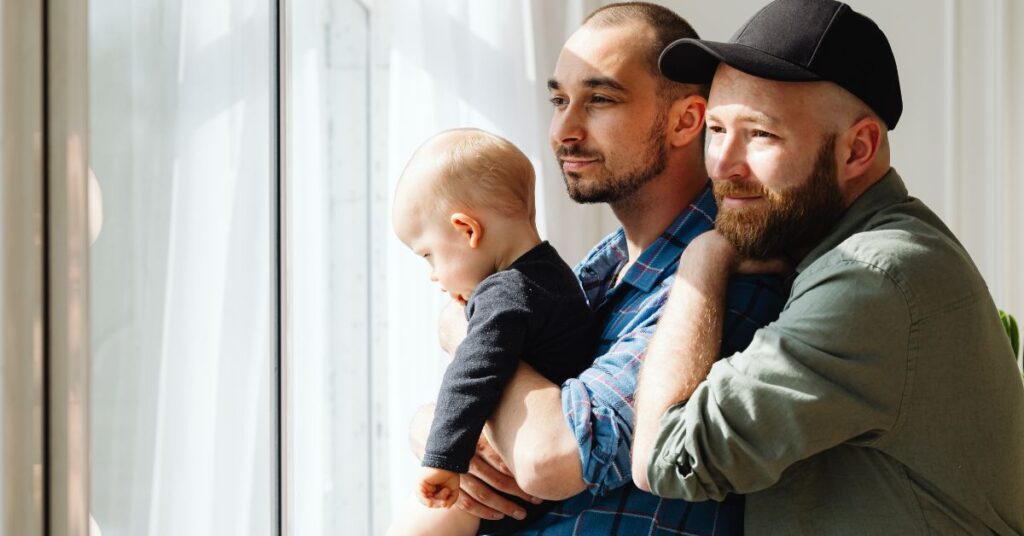Due to technological advancements same-sex male couples can enjoy the pleasures of fatherhood. Many gay couples have been able to grow their family through services such as in vitro fertilization and gestational surrogacy. Starting your fertility journey as a same-sex male couple can be exciting but intimidating as well. Most are at a loss of where to begin and how to choose an egg donor or surrogate. Read on to learn what factors should be considered when you and your partner are exploring egg donation or surrogacy.
The Type of Egg Donor or Surrogate
The type of egg donor or surrogate you choose is a very personal choice between you and your partner. Questions that may arise while shopping for an egg donor or surrogacy candidate are “What would I like my baby to look like?” or “Would I want my child to have a potential IQ?”. Characteristics of what you and your partner would desire in an egg donor or surrogate should be determined before selecting a candidate. When looking for the ideal candidate couples usually keep the following qualities in mind.
These qualities involve egg donor/surrogates:
- Race
- Age
- Educational level
- Lifestyle
- Health History
- Physical Appearance
- Proven Surrogate (meaning the woman has previously proved to have a successful and healthy pregnancy)
How to Choose an Egg Donor
Gay couples searching for a candidate to carry their child should take into consideration a surrogate’s physical health and reproductive history. A thorough medical evaluation can help ensure that she is capable of carrying a healthy pregnancy to term. A surrogate should also possess a stable and supportive environment, as well as a strong support system, to navigate the emotional and physical challenges of pregnancy.
Trust and reliability are essential to have in a surrogacy relationship. This will ensure that the surrogate is committed, responsible, and dedicated to fulfilling her role. Finally, legal considerations and experience with surrogacy should be assessed completely. By carefully evaluating these qualities, gay couples can find a surrogate who will help them realize their dream of becoming parents.

How to Choose a Surrogate
Gay couples searching for a candidate to carry their child should take into consideration a surrogate’s physical health and reproductive history. A thorough medical evaluation can help ensure that she is capable of carrying a healthy pregnancy to term. A surrogate should also possess a stable and supportive environment, as well as a strong support system, to navigate the emotional and physical challenges of pregnancy.
Trust and reliability are essential to have in a surrogacy relationship. This will ensure that the surrogate is committed, responsible, and dedicated to fulfilling her role. Finally, legal considerations and experience with surrogacy should be assessed completely. By carefully evaluating these qualities, gay couples can find a surrogate who will help them realize their dream of becoming parents.
Whose sperm to use for fertilization
Intended parents who belong to the LGBTQ+ community have had the longing for both parents to be genetically linked to the child. Now, through advancements in assisted reproductive technology (ART), both males can be the biological fathers of their children if they are willing to have (fraternal) twins. If a male couple desires to only have one child due to personal or financial reasons, though, they will have to make the choice of whose sperm to use for fertilization. Considerations to take into account when choosing which partner will be the sperm donor will be the family health history of each partner and the sperm quality of each partner. Another way to indicate which one will be most suitable as the sperm donor would be through testing the sperm quality of each couple. This will be important to see which one has a higher success rate, better genetics, identify any hereditary diseases, etc.

Traditional VS Same-Sex Male IVF
Traditional IVF and same-sex male IVF differ in various ways. Through the help of assisted reproductive technology (ART) straight and LGBTQ+ couples can now conceive a child.
The following illustrates the distinctions between the two.
Traditional IVF:
- Procedure: Traditional IVF involves the fertilization of an egg with sperm in a laboratory dish, typically outside of the human body.
- Participants: Traditional IVF is commonly used by heterosexual couples who may be experiencing infertility issues or have difficulty conceiving naturally.
- Genetic material: The egg used in traditional IVF is typically obtained from the female partner or an egg donor, while the sperm is usually provided by the male partner or a sperm donor.
- Fertilization process: In traditional IVF, the sperm is directly injected into the egg, or the eggs and sperm are combined in a dish and left to fertilize naturally.
- Embryo transfer: Once the embryos have developed in the laboratory, one or more embryos are transferred to the uterus of the female partner or a gestational surrogate if necessary.
Same-sex male IVF (also known as reciprocal IVF or gestational surrogacy):
- Procedure: Same-sex male IVF involves the use of assisted reproductive techniques to create embryos using the sperm of one or both male partners and the eggs of a donor. The embryos are then transferred to a gestational surrogate.
- Participants: Same-sex male couples who wish to have a biological child are the primary participants in this process.
- Genetic material: In same-sex male IVF, one partner’s sperm can be used to fertilize donor eggs, and the resulting embryos are transferred to the uterus of a gestational surrogate. Alternatively, both partners can contribute sperm to fertilize separate batches of eggs, creating embryos that are then transferred to the surrogate.
- Gestational surrogacy: Same-sex male IVF often requires the involvement of a gestational surrogate who carries the pregnancy on behalf of the couple.
- Parental rights: Legal considerations related to parental rights may vary depending on the jurisdiction. Some regions recognize both partners as legal parents, while others may require additional legal processes, such as adoption or parental recognition.
It’s important to note that the specific details and procedures involved in IVF can vary depending on individual circumstances, local regulations, and the preferences of the individuals or couples involved. Consulting with a medical professional or fertility specialist is essential for personalized guidance and information on available options.
Financial Cost
It’s important to keep in mind that not all IVF donor cycles will materialize into a pregnancy. Note that treatment is never guaranteed the first time around. There are cases where the egg will not be implanted successfully in the chosen surrogate. It may take a couple of cycles to achieve the desired result whether it be a boy, girl, or set of twins. Speak to your partner beforehand to decipher how much you both are willing to invest in the fertility process. Unlike a heterosexual couple, same-sex male couples will need to consider the cost of egg donation and surrogacy in addition to the IVF treatment.

Exploring Your Fertility Options
Choosing to grow your family is a life-changing decision and those seeking assistance should only accept the help from a reputable fertility center. Reproductive Fertility Center has been helping LGBTQ+ families grow for almost two decades. Contact one of our expert team members for more information and start your fertility journey today!
Learn About Treatments for the LGBTQIA+ Community
We strongly believe that LGBTQIA+ individuals and couples have the right to access inclusive fertility treatments that affirm their identities and help them fulfill their dreams of starting a family. If you’re interested in learning more about fertility options specifically designed for same-sex and transgender couples, we invite you to visit our dedicated page for the community. We look forward to having the opportunity in helping you navigate this journey towards parenthood with support and understanding.




